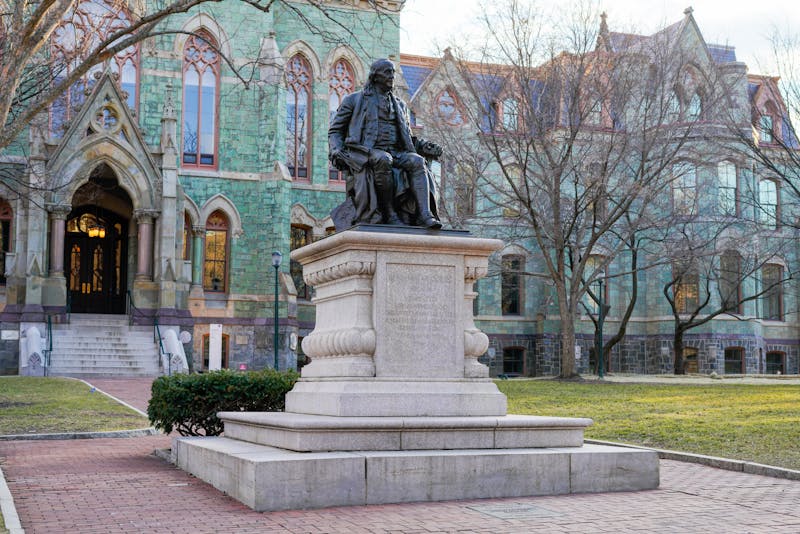
Over the past 143 years, Penn football has won seven national championships and 18 Ivy League titles
Credit: Chase SuttonThe year was 1876. Ulysses S. Grant was President, Alexander Graham Bell had just invented the telephone, and the Penn Quakers fielded their first organized football team—laying the foundation of one of the most historic football programs in college football history.
Over the past 143 years, Penn football has had no shortage of accolades. They have won seven national championships and 18 Ivy League titles, while sending 63 players to the NFL. They have played 1,393 games — the most in college football history.
Make no mistake, though; Penn football came from humble beginnings. The program's inaugural season didn't go well; Princeton, lured to play by Penn's offer of $50 to cover travel expenses, defeated Penn six goals to zero in a 90 minute game. Penn football wouldn't post a winning record until 1883.
Fortunes started to change for the Quakers when they made George H. Woodruff head coach in 1892. In his first year coaching the Red and Blue, Woodruff led the Quakers to a 15-1 record and helped the Quakers defeat Princeton for the first time in program history.
In 1895, 125 years ago this year, Franklin Field was constructed and became the new home of Penn football. Before they played at Franklin Field, the Quakers played at the site where the Quad is now.
Woodruff, who was studying at Penn Law, went on to post a 124-15-2 record in his ten years at Penn, leading the Quakers to three national championships. As coach, Woodruff introduced new plays such as “guards-back" formation, the “delayed pass,” and “flying interference.” In the Quakers first season at Franklin Field, Woodruff led the Quakers to a 14-0 record. His best season came three years later in 1897, when he led Penn to a perfect 15-0 record.
Though Woodruff retired from football, Carl "Cap" Williams picked up right where Woodruff left off. Williams defeated Harvard in 1905. The Crimson, frustrated at losing, denounced Penn's use of Wharton students instead of athletes studying arts and sciences. Harvard refused to face Penn again on the gridiron until 1927, following the opening of Harvard's own business school.
During his time at Penn, Williams led the Quakers to two national championships while college football continued to develop its rules. After reforms by the IAAUS, which would later be renamed the NCAA, the forward pass was legalized and mass momentum plays were banned, which had caused an alarming amount of deaths until that point.
Sol Metzger took over as head coach in 1908, and the Quakers won another national championship with the efforts of All-American senior Bill Hollenback and All-American tight end Hunter Scarlett. In 1912, the Quakers completed one of the program's most memorable comebacks against Michigan. Penn, trailing 21-0 against Michigan at the half, received a wake-up call when trainer Mike Murphy, dying of tuberculosis, donned a uniform to "show these boys how to fight." Penn proceeded to finish the game on a 27-0 run en route to victory.
Louis Young led the Red and Blue to their most recent college football championship in 1924, though George Munger came close in the Quakers' undefeated 1947 season. Led by three All-Americans, future hall-of-famers George Savitsky, Anthony Menisi, and Chuck Bednarik, Penn finished 7-0-1 in 1947, winning the Lambert Trophy as the best team in the East and reaching No. 7 in the AP poll.
In 1954, Penn joined the Ivy League football conference, and they captured their first Ivy League championship in 1959. The Red and Blue were led by coach Steve Sebo; 1959 marked Sebo's only winning season as the coach of the Quakers.
23 years later, Penn reclaimed the top spot of Ancient Eight football. After going 1-9 in his first season with the Quakers and being ranked as the No. 3 worst team in the nation, Jerry Berndt won four straight Ivy League championships between 1982 and 1985. His most decisive game as a coach came in 1982, when Penn held off a late-game Harvard comeback to clinch their second Ivy League title.
Ed Zubrow continued the Quakers' dominance on the gridiron, winning two Ancient Eight championships in three years.
In 1992, the Quakers landed Al Bagnoli as head coach. In just his second year at Penn, Bagnoli led the Red and Blue to an undefeated Ivy League championship. This season marked the beginning of a 22-year run as head coach that saw the Quakers win nine Ivy League championships. During Bagnoli's tenure, he went 148-80 and sent eight players to the NFL.
After Bagnoli retired in 2014, longtime assistant coach Ray Priore was elevated to head coach, and he led the Quakers to back-to-back Ivy League championships in his first two seasons. Some of Priore's notable wins include a stunning victory over Harvard in 2015 that saw the Quakers end the Crimson's 22-game conference winning streak. Just one year later, Penn beat Harvard again thanks to some late-game heroics from senior quarterback Alek Torgerson.
$50 was a hefty sum in 1876, but it's safe to say that the Quakers got a nice return on their investment. Franklin Field has been the location of many important moments for Penn football, and it's safe to say that the program has helped establish the stadium as a such a renowned site.
In 143 years, Penn football has had plenty of nail-biters, produced legendary NFL athletes, and become one of the most decorated college football programs of all-time.
The Daily Pennsylvanian is an independent, student-run newspaper. Please consider making a donation to support the coverage that shapes the University. Your generosity ensures a future of strong journalism at Penn.
Donate






